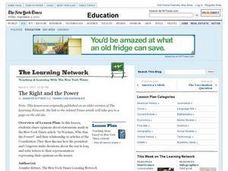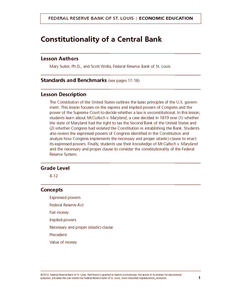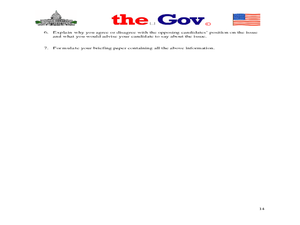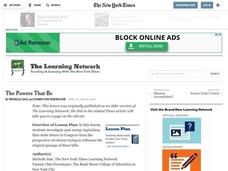C-SPAN
Choice Board: Expressed and Implied Powers
Article 1, Section 8 of the United States Constitution expressly lists powers given to Congress. Over the years, lawmakers have expanded the enumerated powers to include powers implied by the list. To better understand the significance...
American Bar Association
What Is Separation of Powers?
Who has the power? Scholars investigate the creation of the three branches of government in the United States Constitution. They analyze just why the framers created the branches the way they did.
Heritage Foundation
Congress's Territorial Powers, Implied Powers, Citizenship, and the Bureaucracy
An informative resource gives scholars a look into why the US Constitution placed certain federal powers over that of the state. A variety of activities about constitutional clauses helps to create meaningful learning.
US House of Representatives
Legislative Trends and Power Sharing Among Hispanic Americans in Congress, 1977–2012
Bilingual education, voting rights, and Congressional redistricting come up often in the news. Explore these topics from another view—the perspectives of Hispanic members of Congress. Activities include an article with comprehension and...
iCivics
Mini-Lesson: Veto Power
No means no! Scholars analyze the impact of one of the president's most powerful tools—the veto—while also finding out ways to properly check facts for validity. They research the power of the presidential veto with paired activities and...
Curated OER
Why Does Congress Work That Way?
Students discover the powers of Congress. In this legislative branch instructional activity, students examine the legislative process as they analyze Article I of the U.S. Constitution. Students consider the powers of Congress as they...
iCivics
Congress
Through reading materials, worksheets, and a primary source activity, this resource provides an overview of the structure and powers of the legislative branch of government in the United States. Readings review how a bill becomes a law,...
National Endowment for the Humanities
Lesson 2 James Madison: The Second National Bank—Powers Not Specified in the Constitution
How much power is too much power for the federal government? Scholars use primary documents and constitutional research in groups to analyze the creation of the Second National Bank under James Madison. This is the second instructional...
Heritage Foundation
Congress's Economic Powers
Join Congress as they assess their economic abilities for spending—and as they discover their limits. High schoolers use an educational resource to explore Congress's economic powers and learn to apply these concepts to their everyday...
Heritage Foundation
The Powers of the Executive
Are executives as powerful as they sound? High schoolers find out about the US president and executive branch. A variety of activities include scaffolded reading sections, research assignments, and collaborative group work.
Curated OER
The Right and the Power
Students read, discuss and analyze the New York Times article "In Wartime, Who Has the Power?" and relate the article to the Constitution. They then brainstorm how the president and Congress make decisions about the war in Iraq and write...
Curated OER
Structure of Congress
Students examine the structure of Congress. They identify the roles of the Democratic and Republician parties and their leaders. They role play the role of congressmen and pretend to pass new legislation.
Curated OER
Power Plans
In this lesson, young scholars consider what they already know about nuclear power and its uses and then examine an accident at a nuclear power plant. They then research and create reports on nuclear energy.
Federal Reserve Bank
Constitutionality of a Central Bank
Considering the expressed and implied powers of Congress, was it constitutional for the United States to establish the Second National Bank in the early nineteenth century? What is the constitutionality of the Federal Reserve System?
Curated OER
The Role of the Judiciary in a System of Separation of Powers and Checks and Balances
Learners determine the role of each branch of government in a system of checks and balances. They demonstrate the role of the judiciary in American government
Curated OER
Regents Review Worksheet #1: Principles of the U.S. Constitution
Kids who take the Regents Exam really need to know a lot of information. This is a wonderful exam review tool that includes 26 pages of questions, charts, and suggested readings to help upper graders pass the test. It focuses on all...
Curated OER
The Battle for Congress: Midterm Elections 2010
Students research midterm elections. In this United States Congress lesson, students use the Internet to explore the issues, candidates, platforms and stakes of the midterm elections of 2010. This extensive lesson makes use of...
Heritage Foundation
Congress's War Powers
Declaring war is not as easy as some may think. High schoolers learn about Congress's limits regarding war by reading important clauses in the US Constitution. Various independent and collaborative activities reinforce learning, making...
Curated OER
Congress and the Creation of the Bill of Rights
Learners participate in inquiry activities to explore powers outlined in the Bill of Rights. In this Bill of Rights instructional activity, students creation of a class Bill of Rights, evaluate and propose amendments, and analyze...
National Endowment for the Humanities
Lesson 4 James Madison: Internal Improvements Balancing Act—Federal/State and Executive/Legislative
Who has the power? The founding fathers asked the same question when the United States was formed. Learners explore issues that arose during Madison’s presidency that raised constitutional questions. Through discovery, discussion, and...
Curated OER
The Powers That Be
Students investigate past energy legislation, then write letters to Congress from the perspective of citizens trying to influence the original passage of these bills. Each small group does their research using a website imbedded in this...
Curated OER
Writing Exercises: Science and Technology II
All revolutions in science and technology have both pros and cons. Kids examine the advent of the green revolution, nuclear growth, use, and the countries that are considered nuclear powers. They'll construct three responses to each of...
iCivics
The "Federal" in Federalism
How are states in the United States related to each other? Does the government bind them together? Do states have different governments? After reading about federal power as a whole group, your class members will participate in a...
Curated OER
Salmon Vs. Dams: the Dam Removal Debate on the Elwha River
Young scholars role-play a meeting of the Elwha River council in which they present opposing views to council members on hydroelectric power and salmon fisheries resources. They brainstorm possible conflicts between various people in...
Other popular searches
- Delegated Powers of Congress
- Expressed Powers of Congress
- Express Powers of Congress
- Implied Powers of Congress
- U.s. Congress Powers
- Congressional Powers
- The Powers of Congress
- Powers of Congress Song
- Us Congress Powers
- Expressed Powers Congress
- Explicit Powers of Congress
- Expess Powers of Congress

























